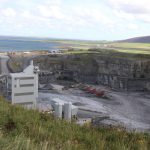

Planning committee not to blame for stone fiasco, says councillor

A “furious” Orkney Islands councillor has railed against any suggestion that Orkney Islands Council’s planning committee is to blame for the “monumental balls up” surrounding the decision to import thousands of tonnes of stone.
Councillor Owen Tierney has let rip at council officials describing the situation as “absolutely ridiculous” and said that it was “total rubbish” to pin the blame on the planning committee.
OIC has sparked widespread public anger after it emerged it will be importing 80,000 tonnes of stone from Glensanda Quarry in Oban. The first 2,700 tonnes are expected to arrive later this month.
So far, OIC has refused to disclose the cost of this mammoth operation citing that this information is “commercially sensitive”.
The move follows the planning committee’s decision to reject a proposed extension to the council-operated Cursiter Quarry after ruling that the scale of the proposals was unjustifiable.
The entire planning committee with the exception of one member opposed the extension as it was presented to councillors back in 2020.
OIC has appealed the decision taken by their own committee to the Scottish Government but this is currently on hold due to COVID-19 restrictions.
Councillor Tierney has been a vocal critic of not only the decision to ship thousands of tonnes of aggregate to the county, but also in the way that it has been managed after he first found out about it by members of the public.
Councillor Tierney had urged the executive director of development and infrastructure Gavin Barr to withdraw the appeal three times, and come back to the planning committee with a reworked application.
“Whatever the legalities of them having the right to appeal to the Scottish Government, in terms of democracy, it flies in the face of it that they didn’t even consult the elected members before making this decision,” an outraged Councillor Tierney said.
“There is no way that the planning committee were intending that the quarry couldn’t get an extension at all. That was not the intention but that’s what’s going out in the public and I am absolutely furious about it.
“We’re being treated as some kind of scapegoats for the fact that they have made this monumental balls up.”
The council say that low rock reserves has meant that there is a need to supplement current supply in order to allow developments across Orkney to progress.
However, Councillor Tierney has claimed that local quarry operators were not consulted on whether supply could have been located within the county, and has asked questions of the procurement and tendering process involved.
In a statement, Mr Barr said: “Criticism of some of what we do, and some of the decisions we take, is inevitable given the breadth of work undertaken by my department. Our teams provide services we all depend on in our daily lives — everything from bin collections to road repairs, from running harbours and local ferries, to operating a commercial quarry at Cursiter.
“We’re being asked why we’ve placed an order for many tonnes of stone to be delivered to the quarry — and why local suppliers weren’t approached. With rock reserves at Cursister running low, a considerable amount of stone is needed to ensure a myriad of local construction projects can continue to progress over the year ahead. That is crucial to the recovery of our community from the COVID-19 pandemic.
“A quarry south is being used because it can readily guarantee the quantity and specification of stone we require — in the timeframe needed to keep local projects supplied. We will, however, be contacting local suppliers on a commercial basis to establish the extent to which they are in a position to help us source future supplies of stone with the specifications we need.
“I am very proud of the development and infrastructure service. Across the board, colleagues are working extremely hard, undertaking a huge amount of work to the great benefit of our local community. And, like many in our community, they are doing this in very difficult circumstances at present.
“These challenging times have stretched our capacity further than ever before, but this comes with increased risk and regrettably things can sometimes go wrong. I acknowledge there have been well publicised examples of this in recent years. But I firmly believe that this doesn’t reflect a lack or care or commitment within the department.”
There will be more on this story in next week’s The Orcadian.